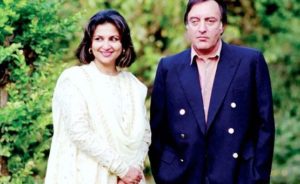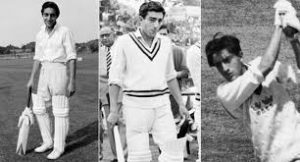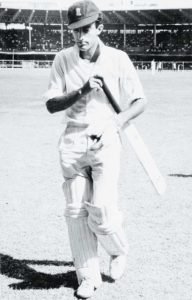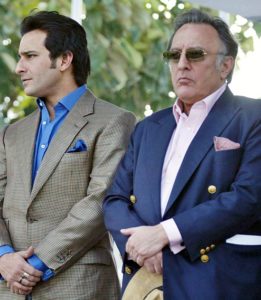Mansur Ali Khan Pataudi : The nawab of cricket

Kersi Meher-Homji remembers interviewing the legend
Although it happened 23 years ago I remember it as if it was yesterday.
I mean my one-on-one interview with the Nawab of Pataudi junior. In Sydney to open a photographic exhibition Encountering India on 16 May 1997, the Nawab and his charming actress wife Sharmila Tagore were greeted at the Australian Museum by their fans.
Known for his aloof nature I approached him with pessimism but he put me at ease chatting away. The cloudy weather reminded him of the Melbourne Test of 1967-68 when he had scored 75 and 85 runs on a green bouncy MCG pitch — leading from the front.
He considered these two innings as among the best he had played, far ahead of his highest Test score of 203 not out against England in 1963-64.
“The Melbourne Test is special for me”, he recalled. “The pitch was as green as the outfield, the score was 5 for 25 as I limped in, not quite recovered from a hamstring injury. Also, fast bowler ”˜Garth’ McKenzie was on fire.”

His stroke-play and determination against odds in that Melbourne Test reminded commentator and former Australian captain Lindsay Hassett of Bradman days. Mansur considered this tour as his happiest, scoring 339 runs at 56.50 and almost leading India to victory in the Brisbane Test.
He captained India to a 3-1 win over New Zealand a month later, India’s first series win outside the subcontinent.
The amazing part about Mansur is that he played all his 46 Tests (40 as captain), scoring 2793 runs at 34.91, hitting six centuries and taking 27 catches, with vision in only one eye.
A Nawab, a Test captain, a politician, an editor of Sportsworld magazine and author of Tiger’s Tale, Mansur Ali Khan ‘Tiger’ Pataudi lived in the constant floodlight of publicity. Before he gave up the Nawab title, his home contained 150 rooms and employed over hundred servants, seven or eight being his personal attendants.
However, to be recognised as one of the best cover-point and extra-cover fielders in the world gave him the real thrill.
Mansur’s climb to the top appeared to be derailed when a car crash in England in 1961 resulted in the loss of vision in his right eye. He was 20 then.
The Indian selectors, not knowing the full extent of his eye injury, appointed him to captain the President’s XI against Ted Dexter’s MCC at Hyderabad that summer. Mansur was delighted but batting was not easy. When using contact lenses he had double vision, seeing two balls six inches apart.
“By picking the inner one I managed to score 35 by tea’, Mansur told me. “Then I removed the contact lens and, keeping the bad eye closed, completed the top-score of 70.” After this, he was included in the Delhi Test. In the final Test in Madras (now Chennai) he hit a splendid 103. “This convinced me that I had the handicap licked.”
Mansur became India’s emergency captain in the West Indies in 1962 when Nari Contractor had a near fatal injury facing a Charlie Griffith bouncer. Mansur was 21 then and became the youngest Test captain for India. He retained the captaincy till 1969, then an unprecedented feat in Indian cricket. He is now recognised by many experts as India’s best captain.
To my question as to whether Griffith chucked, he replied firmly, “Yes, very much so, and he was a menace to life and limb. Even now [in 1997] there are a few chuckers ”“ both among quickies and spinners. They should all be thrown out.”
He also felt [in 1997] that Sachin Tendulkar should give up captaincy because “the responsibility of captaining India makes it difficult for him to sleep at night which affects his batting.”
Among the bowlers he revered were Australia’s Dennis Lillee and West Indians Andy Roberts and Wes Hall.
I asked him as to why he was nicknamed Tiger. “To my parents and friends I have always been known as ”˜Tiger’. As an infant I had the tigerish propensity for crawling energetically about the floor on all fours”.
Tiger Pataudi played two glorious innings against England at Headingley in 1967 after India was forced to follow on 386 runs behind. India was on her knees at 7 for 92 before being revived by Mansur’s do-or-die 64. In the second innings, he hit a glorious 148.
Earlier, Mansur had captained Oxford and Sussex, honours which had eluded his illustrious father Ifthikar, who had represented both England and India at Test level.

Mansur Pataudi, an adventurous captain, stroke-player and a superb fielder, gave Indian cricket character and positivity.
Who made the greatest impression on him?
“Pandit Jawaharlal Nehru made a remarkable impression on me and I just can’t forget him, for various reasons.”
Both Pataudis, senior and junior, were honoured by Wisden as Cricketers of the Year, 36 years apart; Iftikhar in 1932 and Mansur in 1968. Only the Parks from England, James H. Parks in 1938 and his son the wicket-keeper James M. Parks in 1968, were both similarly recognised by Wisden.
When Mansur married the famous actress Sharmila Tagore in 1968, the event caused both excitement and debate. Pataudi was not only captain of India and a style icon; he was also royalty, and at the time it was frowned upon in conservative India for a royal to marry someone from the film industry, especially someone who had donned a bikini in a photoshoot. Add to this, the two were from different communities. Nonetheless, the pair were married at the Pataudi palace in a well-documented ceremony and became symbols of modernity.
Who was the greater cricketer, Ifthikar or Mansur? Sir Donald Bradman, who saw both play, said: “Pataudi Senior was a fine player, but from observation I feel Pataudi Junior, taking into account his physical affliction, displayed even greater qualities.”
By a weird coincidence, Iftikhar passed away on 5 January 1952 which was Mansur’s 11th birthday.
Both father and son had a fine sense of humour. Iftikhar wrote in a friend’s autograph book: “Fast women and slow horses are no good for a sportsman”. Mansur read this after several years and countered with: “I know nothing about horses, Dad!”

Mansur passed away on 22 September 2011 aged 70 from interstitial lung disease. He was survived by wife Sharmila, son Saif and daughters Soha and Saba. Sharmila, Saif and Soha are prominent actors in Indian movies.
As a final gift to humanity, Mansur Pataudi donated his good eye.
Short URL: https://indiandownunder.com.au/?p=15249
